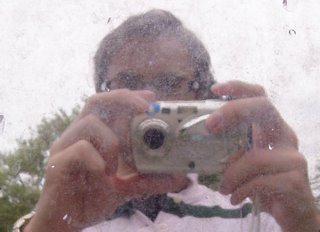Beyond Jupiter and the Great Infinite
The "Stanley Kubrick Film Festival" continued with 2001: A Space Odyssey. Honestly, what can I say about this film other than if you haven't seen it, do so. It's one of the prime film experiences of my life and it gets better and better with each subsequent viewing.
The "Dawn of Man" sequence is sheer brilliance. I've never seen early man portrayed so well. Rumour has it that when the Academy Awards nominations came out in 1967, the reason that this film didn't get the Best Make-Up award was that the Academy members didn't realize that the apes (Australopithicus from my best guess) were actually people in suits, and believed them to be actual apes. So the award went to Planet of the Apes, ironically. The whole sequence however is somewhat disquiting, as Moon Watcher encounters the monolith and is the first one to touch it through to the discovery of tools and weapons. It really resonates with me at the moment, again because of the uncanny parallels with Ronald Wright's A Brief History of Progress. Think about the 10 million or so years that mankind has been around, and for most of it, 99.5% of it, we were little more than hunter-gatherers. Kubrick's portrayal of the quantam leap that is civilization is remarkablely prescient.
Kubrick's use of music is wonderful. He choose different classical pieces as a temp track, but in the end he decided to go with those pieces as the final soundtrack. Each piece captures either the fear or wonder of the film perfectly. I cannot imagine the opening without "Thus Spake Zarathustra" or the docking on the space station without "Blue Danube."
The ending is the part that for many is the puzzling and frusterating part of the film, but for me the ending gets better and better with each viewing. The evolution of Dave Bowman into Star Child is confusing and disquieting, but it's so amazing too. I loved watching this on DVD with surround sound. For a solid 20 minutes you are purely immersed in images, colours and sounds, with no dialogue. It's one of the most experiential moments in cinema. Perhaps what some would call "Pure Cinema." At the end, when the Star Child looks at the camera, you feel as if you have experienced something.
I think 2001 is Kubrick's finest film. Easily one of the greatest films ever made, and the finest work of cinematic science fiction ever made (Star Wars is not science fiction, for the record, it is a fantasy with space elements). I'm really enjoying doing this Kubrick festival, even if the watch-it-all-in-one-sitting thing fell through, this is going to be a great week for film watching.
Next up: A Clockwork Orange.


0 Comments:
Post a Comment
<< Home